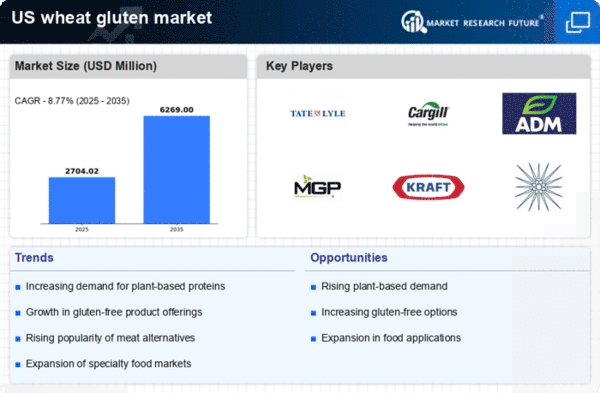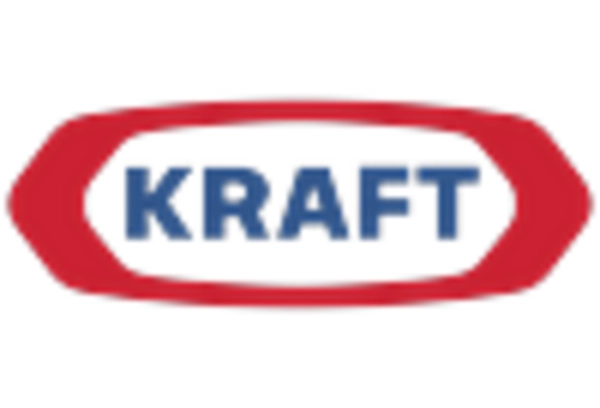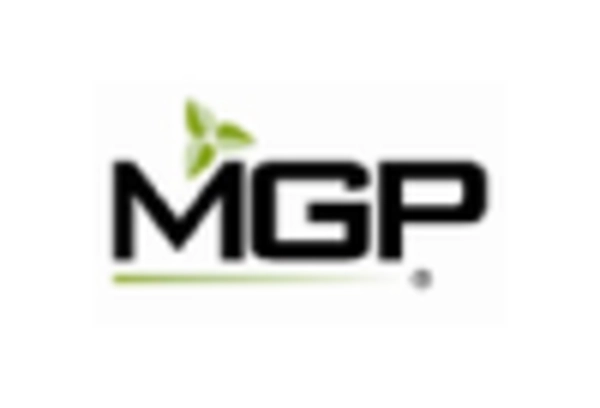Expansion of the Bakery Sector
The wheat gluten market is significantly influenced by the expansion of the bakery sector in the US. Wheat gluten enhances the texture and elasticity of dough, making it a vital ingredient in bread and other baked goods. The US bakery market is expected to grow at a CAGR of around 3.5% from 2025 to 2030, driven by the increasing consumption of artisanal and specialty breads. This growth in the bakery sector is likely to create a corresponding increase in demand for wheat gluten, as bakers seek to improve product quality and performance. Consequently, the wheat gluten market stands to benefit from this upward trend.
Growing Popularity of Meat Alternatives
The wheat gluten market is experiencing a notable surge in demand due to the increasing popularity of meat alternatives. As consumers become more health-conscious and environmentally aware, they are gravitating towards plant-based diets. Wheat gluten, known for its high protein content and meat-like texture, serves as a key ingredient in various meat substitutes. In 2025, the market for meat alternatives in the US is projected to reach approximately $4.5 billion, with wheat gluten playing a crucial role in this growth. This trend indicates a shift in consumer preferences, which is likely to bolster the wheat gluten market as manufacturers innovate to meet the rising demand.
Increased Investment in Food Innovation
The wheat gluten market is benefiting from increased investment in food innovation and product development. Companies are focusing on creating new applications for wheat gluten, such as in snacks, protein bars, and ready-to-eat meals. This trend is driven by consumer demand for convenient, nutritious, and high-protein food options. In 2025, the US food innovation market is expected to grow by approximately 5%, indicating a robust environment for the introduction of wheat gluten-based products. As manufacturers invest in research and development, the wheat gluten market is likely to see a proliferation of innovative products that cater to evolving consumer preferences.
Rising Awareness of Gluten-Free Products
The wheat gluten market is also impacted by the rising awareness of gluten-free products among consumers. While gluten is a key component of wheat gluten, the demand for gluten-free alternatives has led to a diversification of product offerings. In 2025, the gluten-free food market in the US is projected to reach $7 billion, prompting manufacturers to explore innovative formulations that cater to both gluten-free and traditional consumers. This dual approach may create opportunities for the wheat gluten market to adapt and expand its product range, ensuring that it remains relevant in a changing dietary landscape.
Sustainability Initiatives in Food Production
The wheat gluten market is increasingly influenced by sustainability initiatives within the food production sector. As consumers become more environmentally conscious, there is a growing demand for sustainable ingredients. Wheat gluten, being a plant-based protein, aligns well with these sustainability goals. In 2025, the market for sustainable food products in the US is projected to reach $150 billion, highlighting the potential for wheat gluten to play a significant role in this movement. Companies that prioritize sustainable sourcing and production methods may find themselves at a competitive advantage, thereby positively impacting the wheat gluten market.
















